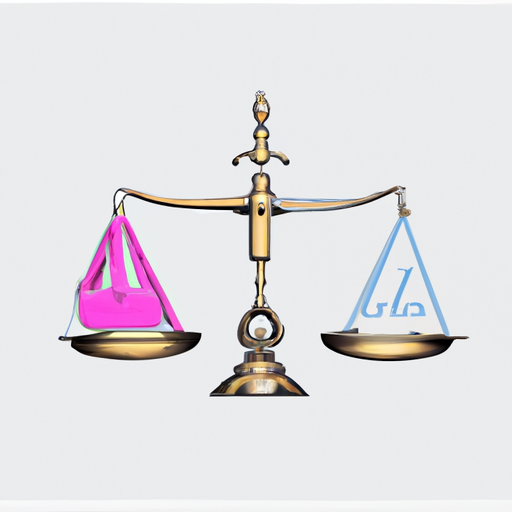In an increasingly digital world, the fashion industry has turned to social media as a powerful tool for marketing and promoting their products. However, with this new platform comes a myriad of legal considerations that businesses in the fashion industry must be aware of. From false advertising claims to intellectual property infringement, social media claims compliance is a crucial aspect of protecting a fashion brand’s reputation and avoiding legal repercussions. In this article, we will explore the importance of social media claims compliance for the fashion industry, discuss the potential risks involved, and provide practical guidance on how businesses can navigate this legal landscape successfully. For businesses seeking comprehensive legal advice and guidance tailored to the unique needs of the fashion industry, contacting a skilled lawyer specializing in social media claims compliance is highly recommended.
Understanding Social Media Claims Compliance
In today’s digital age, social media has become an integral part of the fashion industry’s marketing strategy. It allows businesses to connect with their target audience on a global scale, showcase their products, and engage with customers effectively. However, with the widespread use of social media comes the need for compliance with various regulations and laws. This article will provide a comprehensive overview of social media claims compliance for the fashion industry, including the importance of compliance, types of claims, responsible parties, legal consequences of non-compliance, and best practices to ensure compliance.
Why is Social Media Claims Compliance Important?
Social media claims compliance is crucial for fashion brands as it helps maintain transparency and integrity in advertising practices. It ensures that businesses do not make false, misleading, or deceptive claims about their products or services on social media platforms. By adhering to compliance regulations, fashion brands build trust and credibility among their customers, fostering long-lasting relationships and loyalty. Failure to comply can result in legal consequences, damage to the brand’s reputation, and loss of customer trust.
What are Social Media Claims?
Social media claims refer to statements made by fashion brands on social media platforms regarding their products or services. These claims can include descriptions, benefits, features, performance, and other attributes of the products. It is essential for fashion brands to ensure that these claims are accurate, truthful, and substantiated by evidence to avoid misleading the consumers.
Who is Responsible for Social Media Claims Compliance?
The responsibility for social media claims compliance primarily lies with the fashion brand itself. As the entity making the claims, it is essential for the brand to ensure that the statements made on social media platforms adhere to relevant laws and regulations. This responsibility extends to not only the brand’s marketing team but also its employees, agencies, and influencers who are associated with promoting the brand on social media.
Legal Consequences of Non-Compliance
Non-compliance with social media claims regulations can have severe legal consequences for fashion brands. Regulatory authorities, such as the Federal Trade Commission (FTC) in the United States, have the power to investigate and penalize brands that engage in deceptive or misleading advertising practices. Penalties for non-compliance can include fines, injunctions, and even damage to the brand’s reputation. Additionally, private individuals or competitors may also initiate legal actions against non-compliant brands, further escalating the legal consequences.
Legal Framework for Social Media Claims Compliance
To ensure social media claims compliance, fashion brands must navigate through various legal standards and regulations. Understanding the legal framework that governs social media claims helps brands align their practices with the law. The following are key areas of the legal framework for social media claims compliance:
Advertising Standards and Regulations
Fashion brands must comply with advertising standards and regulations set by regulatory authorities such as the FTC, Advertising Standards Authority (ASA), and European Union (EU) regulatory authorities. These standards outline guidelines for truthful advertising, substantiation of claims, disclosure of commercial relationships, and fair competition practices.
Intellectual Property and Trademark Laws
Fashion brands should also consider intellectual property and trademark laws when making claims on social media. By using trademarks and copyrights without proper authorization or infringing on others’ intellectual property rights, brands risk legal actions from trademark owners or copyright holders. Ensuring the proper use of trademarks and copyrights helps fashion brands protect their intellectual property while avoiding legal disputes.
Consumer Protection Laws
Consumer protection laws aim to safeguard consumers from deceptive or unfair trade practices. Fashion brands must ensure that their claims do not mislead or deceive consumers. These laws govern areas such as false advertising, unfair competition, unfair or deceptive trade practices, and providing accurate product information.

Privacy and Data Protection Laws
In the age of data-driven marketing, fashion brands must also consider privacy and data protection laws when using social media for advertising. Brands should comply with privacy regulations that govern the collection, use, and protection of personal information. Proper consent, disclosure, and safeguarding of consumer data are essential to avoid legal repercussions and maintain consumer trust.
Key Considerations for Fashion Industry
The fashion industry has unique challenges when it comes to social media claims compliance. Considerations such as industry-specific regulations, influencer marketing, product descriptions, endorsements, and testimonials play a crucial role in ensuring compliance.
Unique Challenges for Fashion Brands
Fashion brands face unique challenges due to the dynamic nature of the industry. Trends change rapidly, and fashion brands must ensure that their claims align with the current market offerings. Additionally, the fashion industry is highly visual, which adds complexity to claims compliance, as images and visuals can influence consumer perceptions.
Industry-Specific Regulations and Guidelines
Apart from general advertising standards and regulations, the fashion industry has specific regulations and guidelines that brands must follow. These regulations may govern areas such as sizing and labeling requirements, use of certain materials, country of origin disclosure, and ethical sourcing practices. Fashion brands must stay updated with these regulations to ensure compliance.
Influencer Marketing
Influencer marketing has become an influential tool for fashion brands on social media. However, brands must exercise caution when collaborating with influencers to ensure compliance. Transparent disclosure of influencer-brand relationships, accuracy of claims made by influencers, and adherence to advertising guidelines are essential for compliance in influencer marketing campaigns.
Product Descriptions and Claims
Fashion brands must provide accurate and truthful product descriptions and claims to avoid misleading consumers. Claims related to product attributes, performance, durability, and benefits must be supported by reliable substantiation. Properly outlining these claims in compliance with applicable regulations is vital to avoid legal consequences.
Endorsements and Testimonials
Endorsements and testimonials have a significant impact on consumer purchasing decisions. Fashion brands must ensure that any endorsements or testimonials used on social media are authentic and comply with disclosure requirements. Proper disclosure of any material connections or incentives between endorsers and the brand is crucial for transparency and compliance.
Developing a Social Media Claims Compliance Strategy
To effectively comply with social media claims regulations, fashion brands should develop a comprehensive compliance strategy. This strategy should address key areas such as establishing compliance policies and procedures, training and education for employees, monitoring and enforcement, and collaboration with legal professionals.
Establishing Compliance Policies and Procedures
Fashion brands should create clear and comprehensive compliance policies and procedures that outline the standards and guidelines for social media claims. These policies should cover areas such as claim substantiation, disclosure requirements, endorsement practices, and influencer marketing guidelines. Regular updates and reviews of these policies ensure continued compliance with evolving regulations.

Training and Education for Employees
Proper training and education for employees are essential to ensure that they understand the importance of compliance and how it applies to their roles. Training programs should cover topics such as advertising law, claim substantiation, disclosure requirements, intellectual property, and privacy regulations. Ongoing education helps employees stay informed about changes in regulations and reinforces compliance standards.
Monitoring and Enforcement
Fashion brands should implement monitoring mechanisms to ensure compliance with social media claims. Regularly reviewing social media content, monitoring influencer collaborations, and analyzing customer feedback can help identify potential compliance issues. Strong enforcement mechanisms should be in place to address non-compliant claims and take corrective actions promptly.
Collaboration with Legal Professionals
Working with a legal professional experienced in advertising law and the fashion industry can provide valuable guidance and support for social media claims compliance. Legal professionals can help fashion brands navigate complex regulations, review marketing campaigns, provide legal opinions on claims, and ensure compliance with applicable laws.
Social Media Claims Compliance Best Practices
To ensure compliance with social media claims regulations, fashion brands should adhere to best practices that promote accuracy, transparency, and consumer protection. The following are key best practices to consider:
Accuracy and Truthfulness
Ensure that all claims made on social media platforms are accurate and truthful. Claims should be supported by reliable evidence and should not mislead or deceive consumers.
Clear and Disclosed Advertising
Make sure that advertisements and sponsored posts are clearly identified as such. Transparent disclosure of commercial relationships and any material connections between endorsers and the brand is essential.
Avoiding Misleading Statements
Avoid making statements that can mislead consumers about the product or its attributes. Claims should be clear, unambiguous, and not open to misinterpretation.
Proper Use of Trademarks and Copyrights
Obtain proper authorization for the use of trademarks and copyrights in social media content. Unauthorized use of intellectual property can lead to legal disputes and damage the brand’s reputation.
Permission and Consent
Obtain proper consent and permission from individuals whose likeness, testimonials, or endorsements are used in social media content. Compliance with privacy regulations is crucial to protect consumer privacy rights.
Transparency in Influencer Relationships
Ensure transparent disclosure of any material connections or incentives between influencers and the brand. Influencer collaborations should adhere to advertising guidelines and disclosure requirements.
Understanding Disclosure Requirements
Stay informed about disclosure requirements imposed by regulatory authorities, such as the FTC. Properly disclose any commercial relationships, incentives, or free products provided to influencers or other endorsers.
Protecting Consumer Privacy
Comply with privacy regulations, such as the General Data Protection Regulation (GDPR), to protect consumer privacy rights. Safeguarding consumer data and obtaining proper consent for data collection and use is crucial.
Enforcement Mechanisms and Government Agencies
Several government agencies and self-regulatory organizations play a role in enforcing social media claims compliance. Fashion brands should be aware of these enforcement mechanisms when ensuring compliance. Some key enforcement agencies and organizations include:
Federal Trade Commission (FTC)
The FTC is a U.S. regulatory authority responsible for protecting consumers and promoting fair competition. The FTC enforces regulations related to deceptive and unfair trade practices, including social media claims compliance.
Advertising Standards Authority (ASA)
The ASA is a self-regulatory body in the United Kingdom that enforces advertising standards. The ASA promotes responsible advertising and investigates complaints against non-compliant advertisements.
European Union (EU) Regulatory Authorities
The EU consists of various regulatory authorities that enforce advertising standards and consumer protection regulations. These authorities ensure compliance with regulations such as the GDPR and unfair competition laws.

Fashion Industry Self-Regulatory Organizations
Various self-regulatory organizations exist within the fashion industry to promote compliance with industry-specific regulations. These organizations provide guidance, codes of conduct, and mechanisms for resolving disputes related to social media claims compliance.
Social Media Claims Compliance Case Studies
Examining past compliance violations, legal actions, and successful compliance strategies in the fashion industry provides valuable insights for maintaining compliance. Some notable case studies include:
Notable Compliance Violations
Several fashion brands have faced compliance violations related to social media claims. These violations include making false or misleading statements about product attributes, using unverified endorsements, and failing to disclose commercial relationships.
Legal Actions and Penalties
Non-compliant fashion brands have faced legal actions and penalties from regulatory authorities and private individuals. These actions include fines, injunctions, cease-and-desist orders, and damage to brand reputation resulting from negative publicity.
Successful Compliance Strategies
Fashion brands that prioritize social media claims compliance have successfully avoided legal disputes and safeguarded their reputation. These brands employ proactive compliance strategies, consistent monitoring, and effective enforcement mechanisms to stay compliant.
Evaluating Social Media Claims Compliance
Regular audits and assessments are essential for evaluating social media claims compliance. Fashion brands should conduct thorough evaluations of their social media content, influencer collaborations, and marketing campaigns to identify any compliance gaps. Ongoing risk mitigation and continuous improvement help brands maintain compliance effectively.
Regular Audits and Assessments
Conduct regular audits and assessments of social media claims to identify any compliance issues. These audits can include reviewing content for accuracy and compliance with regulations, analyzing disclosures and endorsements, and evaluating claims substantiation practices.
Risk Mitigation
Identify potential compliance risks related to social media claims and develop strategies to mitigate these risks. Consider factors such as changing regulations, industry trends, and consumer expectations when developing risk mitigation plans.
Continuous Improvement
Maintain a culture of continuous improvement to adapt to changing compliance requirements. Regularly update policies, training programs, and monitoring mechanisms to address emerging compliance challenges and ensure ongoing compliance.
Choosing a Legal Advisor for Social Media Claims Compliance
Given the complexity of social media claims compliance, fashion brands should seek legal advice from professionals who specialize in advertising law and understand the dynamics of the fashion industry. When choosing a legal advisor, consider the following factors:
Experience and Expertise in Advertising Law
Choose a legal advisor with extensive experience and expertise in advertising law. A solid understanding of the relevant regulations and advertising standards ensures accurate advice and effective compliance strategies.
Understanding of Fashion Industry Dynamics
Select a legal advisor who comprehends the specific dynamics of the fashion industry. Familiarity with industry-specific regulations, trends, and challenges helps develop tailored compliance strategies that align with the brand’s goals.
Proactive Approach to Compliance
Look for a legal advisor who takes a proactive approach to compliance. This includes regular monitoring of regulations, staying updated with enforcement actions, and providing guidance on emerging compliance issues.
Robust Legal Support
Choose a legal advisor who can provide robust legal support, including reviewing marketing campaigns, drafting compliance policies, conducting internal audits, and representing the brand in legal disputes if necessary.
FAQs about Social Media Claims Compliance for the Fashion Industry
Here are some frequently asked questions about social media claims compliance in the fashion industry:
What types of claims are common on social media platforms for fashion brands?
Fashion brands commonly make claims about product attributes, performance, durability, and styling on social media platforms.
Who can be held legally responsible for non-compliant claims on social media?
The fashion brand itself, as well as its employees, agencies, and influencers, can be held legally responsible for non-compliant claims on social media.
What are the potential consequences of non-compliance with social media claims regulations?
Non-compliance can result in legal actions, penalties, damage to brand reputation, loss of consumer trust, and negative publicity for fashion brands.
Do fashion influencers have to comply with the same regulations as brands?
Yes, fashion influencers are also responsible for complying with regulations related to social media claims. They must make accurate claims, disclose their commercial relationships, and adhere to advertising guidelines.
How can a fashion brand ensure compliance with social media claims on a global scale?
To ensure compliance on a global scale, fashion brands should stay informed about relevant regulations in different countries, collaborate with legal professionals, and adapt marketing strategies to align with local laws and cultural norms.
In conclusion, social media claims compliance is crucial for the fashion industry to maintain transparency, protect consumer rights, and avoid legal consequences. Fashion brands must navigate a complex legal framework, including advertising standards, intellectual property laws, consumer protection laws, and privacy regulations. By developing a comprehensive compliance strategy, adhering to best practices, and collaborating with legal professionals, fashion brands can effectively ensure compliance and protect their reputation in the digital landscape. Should you require expert guidance on social media claims compliance, contact our experienced legal team to schedule a consultation.
FAQs:
-
What types of claims are common on social media platforms for fashion brands? Fashion brands commonly make claims about product attributes, performance, durability, and styling on social media platforms.
-
Who can be held legally responsible for non-compliant claims on social media? The fashion brand itself, as well as its employees, agencies, and influencers, can be held legally responsible for non-compliant claims on social media.
-
What are the potential consequences of non-compliance with social media claims regulations? Non-compliance can result in legal actions, penalties, damage to brand reputation, loss of consumer trust, and negative publicity for fashion brands.
-
Do fashion influencers have to comply with the same regulations as brands? Yes, fashion influencers are also responsible for complying with regulations related to social media claims. They must make accurate claims, disclose their commercial relationships, and adhere to advertising guidelines.
-
How can a fashion brand ensure compliance with social media claims on a global scale? To ensure compliance on a global scale, fashion brands should stay informed about relevant regulations in different countries, collaborate with legal professionals, and adapt marketing strategies to align with local laws and cultural norms.
